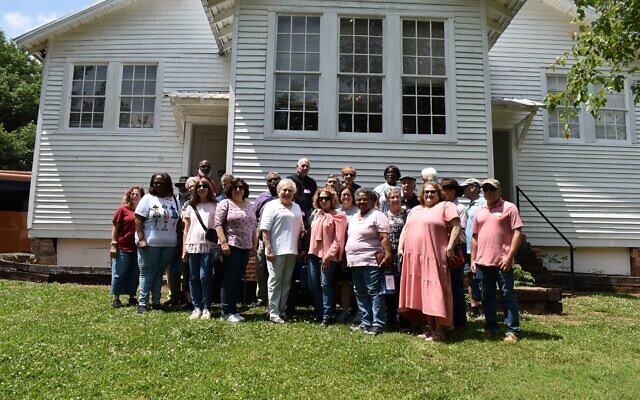Etz Chaim, Turner AME Church Tour Noble Hill School
Members from Congregation Etz Chaim joined parishioners from Turner AME Church and visited an historic site in Cartersville/Cassville, Ga.

Congregation Etz Chaim and the Turner AME Church, both located in Marietta, joined forces on Sunday, May 21, and visited the historic Noble Hill School in Cartersville/Cassville, Ga. Noble Hill was built in 1923 through the Rosenwald School building fund that came about through the collaboration of Booker T. Washington, of the Tuskegee Institute, and Julius Rosenwald, owner of Sears Roebuck. More than 5,000 African American schools, small teacher homes and vocational buildings were built beginning in 1912 to 1932 in 15 southeastern states.
Michael Weinroth, a longtime member of Etz Chaim, spearheaded this trip, along with executive director Marty Gilbert. Weinroth has spent years researching and working with Rosenwald Schools in Georgia. According to Weinroth, there were originally 241 Rosenwald Schools in Georgia, but after the doctrine of “separate but equal” was struck down, local school boards began building new schools for African American children around the state. As a result, the modest one-to-four classroom type buildings that were most common began coming down.
“These schools, in each of their respective communities, meant so much to the parents and children who attended,” stated Weinroth. It was a source of pride that a community had a school. The cost to build these schools was shared by parents, the local school board, and money from the Rosenwald Fund. “In those days when African Americans were required to put in a third of the money, they had already been paying a school tax for years, which had given them nothing. I guess you could say the system was rigged against them.”
These schools, besides being a place of learning, gave children a feeling of security, respect, and love. “When I’ve had the opportunity to hear alumni talk about their modest schools, there is always an emotional moment,” Weinroth said.
Weinroth is a member of Etz Chaim’s adult learning committee, Lilmode. When he began talking about Rosenwald schools, none of the other members were aware of this massive building program in the Southeast that lasted for more than 20 years. It was during one of these meetings that the idea of a field trip to one of these historic schools began being discussed. Additionally, Gilbert thought it would be a great opportunity for African Americans at a nearby church to participate with his congregation.
A 34-passenger bus was chartered for the round-trip visit to Noble Hill. On the way, Weinroth described the backgrounds of both Booker T. Washington and Julius Rosenwald and the historic moment that both men met in Chicago in 1911. They became close friends and allies in their work to equalize educational opportunities for African American children in the South, and although Booker T. Washington died in 1915, Rosenwald continued the building program through 1932 as they had agreed.
For the two groups that boarded the bus as total strangers, many new friends were made. Future plans with the two congregations are already being discussed.



comments